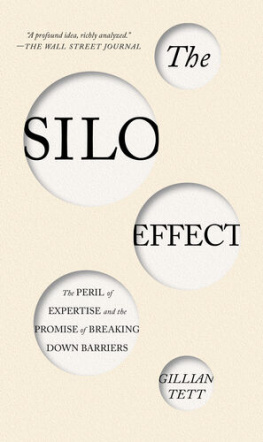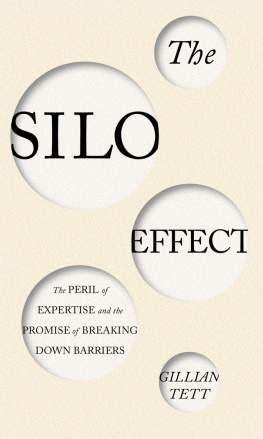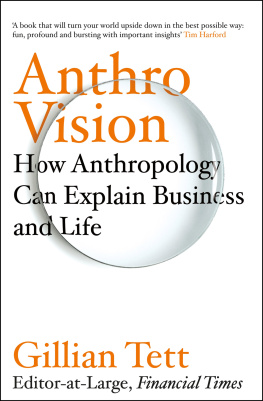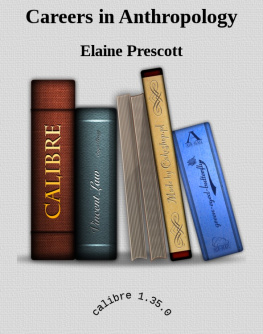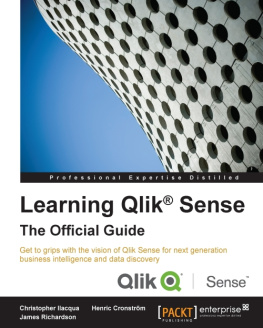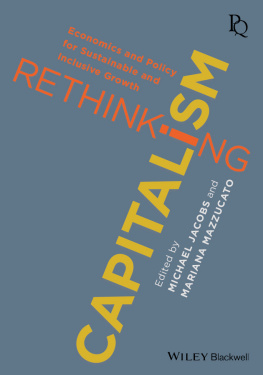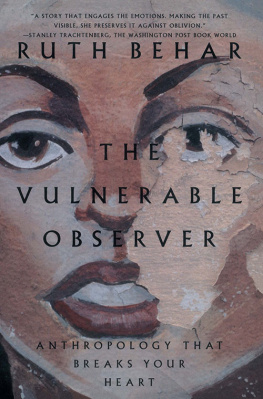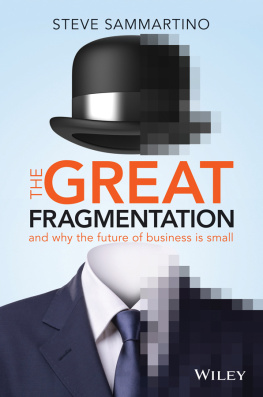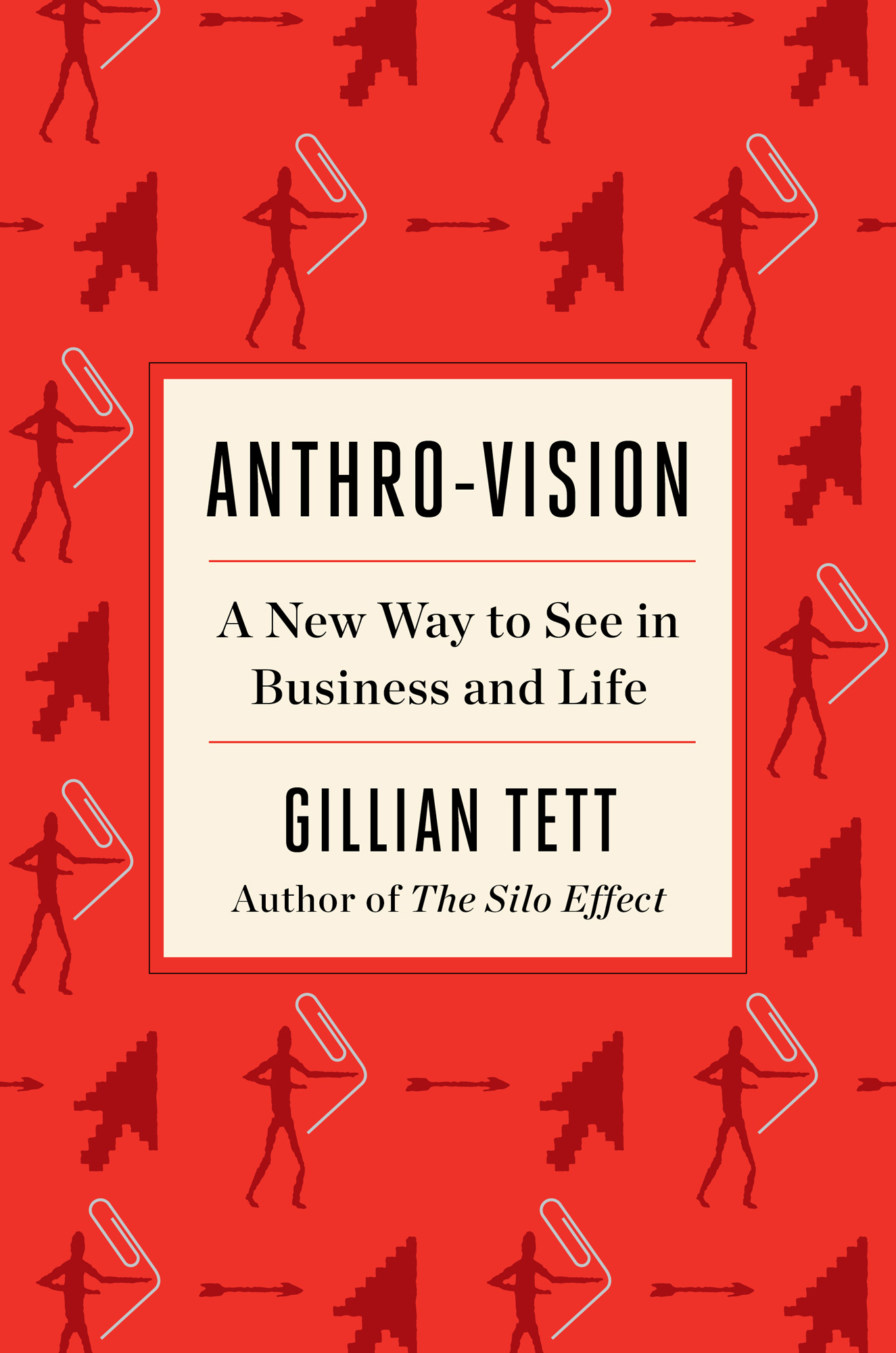Anthro-Vision
A New Way to See in Business and Life
Gillian Tett
Author of The Silo Effect
Thank you for downloading this Simon & Schuster ebook.
Get a FREE ebook when you join our mailing list. Plus, get updates on new releases, deals, recommended reads, and more from Simon & Schuster. Click below to sign up and see terms and conditions.
CLICK HERE TO SIGN UP
Already a subscriber? Provide your email again so we can register this ebook and send you more of what you like to read. You will continue to receive exclusive offers in your inbox.
Dedicated to the memory of Ruth Winifred Tett and Katherine Ruth Gilly (Tett), who both took joy from the familiar, but were always curious about strange
The least questioned assumptions are often the most questionable.
PAUL BROCA
Research is formalized curiosity. It is poking and prying with a purpose.
ZORA NEALE HURSTON
PREFACE THE OTHER AI
(OR ANTHROPOLOGY INTELLIGENCE)
The last thing a fish would ever notice would be water.
Ralph Linton
I sat in a drab Soviet hotel room in May 1992. Gunfire rattled the windows. Across the room, on a bed with a nasty brown blanket, sat Marcus Warren, a British journalist. We had been trapped in the hotel for hours, as battles raged on the streets outside in Dushanbe, the capital city of Tajikistan. We had no idea how many had died.
What did you do in Tajikistan before? Marcus asked me, as we nervously listened to the fighting. Until a year earlier this mountainous country, bordering Afghanistan, had seemed a permanent and peaceful part of the Soviet Union. But in August 1991 the Soviet regime had collapsed. That dissolution had propelled the country to independence and sparked a civil war. Marcus and I were there as reporters, respectively for the Daily Telegraph and the Financial Times.
But my background was weird. Before I joined the Financial Times, I had been based in Tajikistan doing research for a PhD in anthropology, that oft ignored (and sometimes derided) branch of the social sciences that studies culture and society. Like generations of earlier anthropologists, I had engaged in fieldwork, which meant immersing myself in a high mountain village a three-hour bus ride from Dushanbe. I lived with a family. The aim was to be an insider-outsider, to observe the Soviet villagers at close quarters and study their culture in the sense of their rituals, values, social patterns, and semiotic codes. I explored questions such as: What did they trust? How did they define a family? What did Islam mean? How did they feel about Communism? What defined economic value? How did they organize their space? In short: What did it mean to be human in Soviet Tajikistan?
So what exactly did you study? Marcus asked.
Marriage rituals, I replied.
Marriage rituals! Marcus exploded, hoarse from exhaustion. What the hell is the point of that? His question masked a bigger one: Why would anyone go to a mountainous country that seemed weird to Westerners and immerse herself in an alien culture to study it? I understood his reaction. As I later admitted in my doctoral thesis: With people dying outside on the streets of Dushanbe, studying marriage rituals did sound exoticif not irrelevant.
This book has a simple aim: to answer Marcuss questionand show that the ideas emanating from a discipline that many people think (wrongly) studies only the exotic are vital for the modern world. The reason is that anthropology is an intellectual framework that enables you to see around corners, spot what is hidden in plain sight, gain empathy for others, and fresh insight on problems. This framework is needed more than ever now as we grapple with climate change, pandemics, racism, social media run amok, artificial intelligence, financial turmoil, and political conflict. I know this from my own career: as this book explains, since I left Tajikistan, I have worked as a journalist and used my anthropology training to foresee and understand the 2008 financial crisis, the rise of Donald Trump, the 2020 pandemic, the surge in sustainable investing, and the digital economy. But this book also explains how anthropology is (and has been) valuable for business executives, investors, policy makers, economists, techies, financiers, doctors, lawyers, and accountants (yes, really). These ideas are as useful in making sense of an Amazon warehouse as in an Amazon jungle.
Why? Many of the tools we have been using to navigate the world are simply not working well. In recent years we have seen economic forecasts misfire, political polls turn out to be wrong, financial models fail, tech innovations turn dangerous, and consumer surveys mislead. These problems have not arisen because those tools are wrong or useless. They are not. The problem is such tools are incomplete; they are used without an awareness of culture and context, created with a sense of tunnel vision, and built assuming that the world can be neatly bounded or captured by a single set of parameters. This might work well when the world is so stable that the past is a good guide to the future. But it does not when we live in a world of flux, or what Western military experts describe as VUCA, short for volatility, uncertainty, complexity, and ambiguity. Nor when we face black swans (to cite Nassim Nicholas Taleb), radical uncertainty (as the economists Mervyn King and John Kay say), and an uncharted future (to quote Margaret Heffernan).
Or to put it another way, trying to navigate the twenty-first-century world only using the tools developed in the twentieth-century, such as rigid economic models, is like walking through a dark wood with a compass at night and only looking down on the dial. Your compass may be technically brilliant and tell you where to aim. But if you only focus on the dial, you may walk into a tree. Tunnel vision is deadly. We need lateral vision. That is what anthropology can impart: anthro-vision.
This book offers extensive ideas about how to gain anthro-vision, using personal and third-party stories that explore questions such as: Why do we need offices? Why do investors misread risks? What matters to modern consumers? What should economists learn from Cambridge Analytica? What is driving green finance? How should governments Build Back Better? How does culture interact with computers? Before plunging into the details, however, there are three core principles of the anthropology mindset that are the most important to grasp, and which shape the structure of this book. The first idea is that in an era of global contagion, we urgently need to cultivate a mindset of empathy for strangers and value diversity. Anthropologists are experts in this since the discipline was founded around the goal of venturing to far-flung places to study seemingly exotic peoples. That creates a whiff of Indiana Jones. But that tag is misleading. Exotic is in the eye of the beholder since every culture can seem strange to another and nobody can afford to ignore what seems strange in a globalized world (or dismiss other cultures as shitholes, as former president Donald Trump did). Flows of finance, commerce, travel, and communication connect us, creating constant contagion, involving not just germs but money, ideas, and trends. However, our understanding of others has not expanded at the same pace as our interconnections. That creates risks and tragically missed opportunities. (Chapter Three explains that if only Western policy makers had bothered to learn some lessons from strange countries in West Africa or Asia, they would never have fallen prey to the COVID-19 pandemic.)

